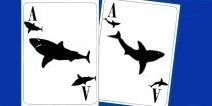|

Join our Newsletter
& get our free guide Starting Hands Revealed
We hate spam too!
We value your privacy and never share your email. All our emails have an opt-out link. Click it, and you will never hear from us again. |
Making Moves
We got a lot of inspiration from Harrington on Hold'em, Volume 2 for this article. Chapter eight of this poker reference book covers various moves in tournament poker and we are in great debt to Dan Harrington's depth of poker move knowledge. Making Moves in Poker TournamentsThere are two kinds of moves in poker. Either you want to represent strength with a weak hand and this is called bluffing, or you want to appear weak with a monster in order to lure more chips into the pot and this is called slow playing. The most frequent type of bluff is the continuation bet or c-bet. A c-bet is not always a bluff, but oftentimes the preflop raiser must bet on the flop otherwise it is like telegraphing that he missed the flop. The automatic nature of the c-bet makes it the usual suspect for a bluff. It is an art form both to make a c-bet and to respond to a c-bet. The size of a c-bet should normally be around half the pot. Large pot-sized c-bets are very dangerous because if you are called, this can lead to an enormous pot by the river and introduce unnecessary variance into your stack. If you completely missed the flop, the c-bet is recommended because if you meet resistance, then you know that you do not need to add any more chips into the pot. Conversely if you hit a draw, you may abstain from c-betting if last to act in order to deny any check-raising opportunity to your opponent trying to take you out of the hand. The best weapon against these frequent c-bets is to observe the betting patterns of your opponents. One statistic readily available from online poker software is the c-bet frequency. Always keep in mind the important notion that most of the time, the preflop raiser will have missed the flop. On average everyone gets the same cards, so by observing the idiosyncratic statistics of each player you will uncover who the bluffers are. A player with a c-bet frequency over 65% cannot hit the flop that often and must frequently make moves. Conversely if the c-bet frequency is below 50%, you are playing against a player who does not take risk and you should only call with a strong hand. Also pay attention to the c-bet size. Weaker players make larger bets with their larger hands, and vice versa with weaker hands. The real tough players are the hardest to read, as they mix their bet size in an unpredictable manner. Another move is the "squeeze" which goes as follows. One player raises, another player calls the raiser and as the third player to enter the hand, you reraise. The first player in the hand is squeezed because if he calls the reraise, he does not know what the player behind him will do and he may have to add even more chips if the latter 4-bets. So he folds. The second player himself only called the first raiser and did not reraise him, representing that he does not have hole cards sufficiently strong to continue in this hand. Thus he folds to your reraise. Slow playing is the opposite of bluffing. Slow play can be said to be overused in poker, especially by inexperienced players. After all, poker is about deceiving and what better satisfaction than to trap your adversary and imagine his dismayed face at the river when he sees your monster hand. Slow playing is a move that must be used with caution as it gives a chance to your opponent to improve his hand or to put you in a difficult spot if a scary card comes at the turn. Use slow play preferably against loose aggressive players who will do the betting for you, but not against nits or rocks. Hone your tournaments skills and practice making moves in our selection of the best poker sites. These poker rooms offer tons of poker tournaments at all levels of buy-in and at all hours of the day. You will never have to wait to play in a tournament. And now mobile poker is coming, where you can play online poker from your phone. |




 In Texas Hold'em Poker, ladies are not allowed to make moves by lying down provocatively on the table.
It is against poker etiquette. More seriously, in poker jargon to make a move means to play
a hand differently from what its true value warrants.
In Texas Hold'em Poker, ladies are not allowed to make moves by lying down provocatively on the table.
It is against poker etiquette. More seriously, in poker jargon to make a move means to play
a hand differently from what its true value warrants.





